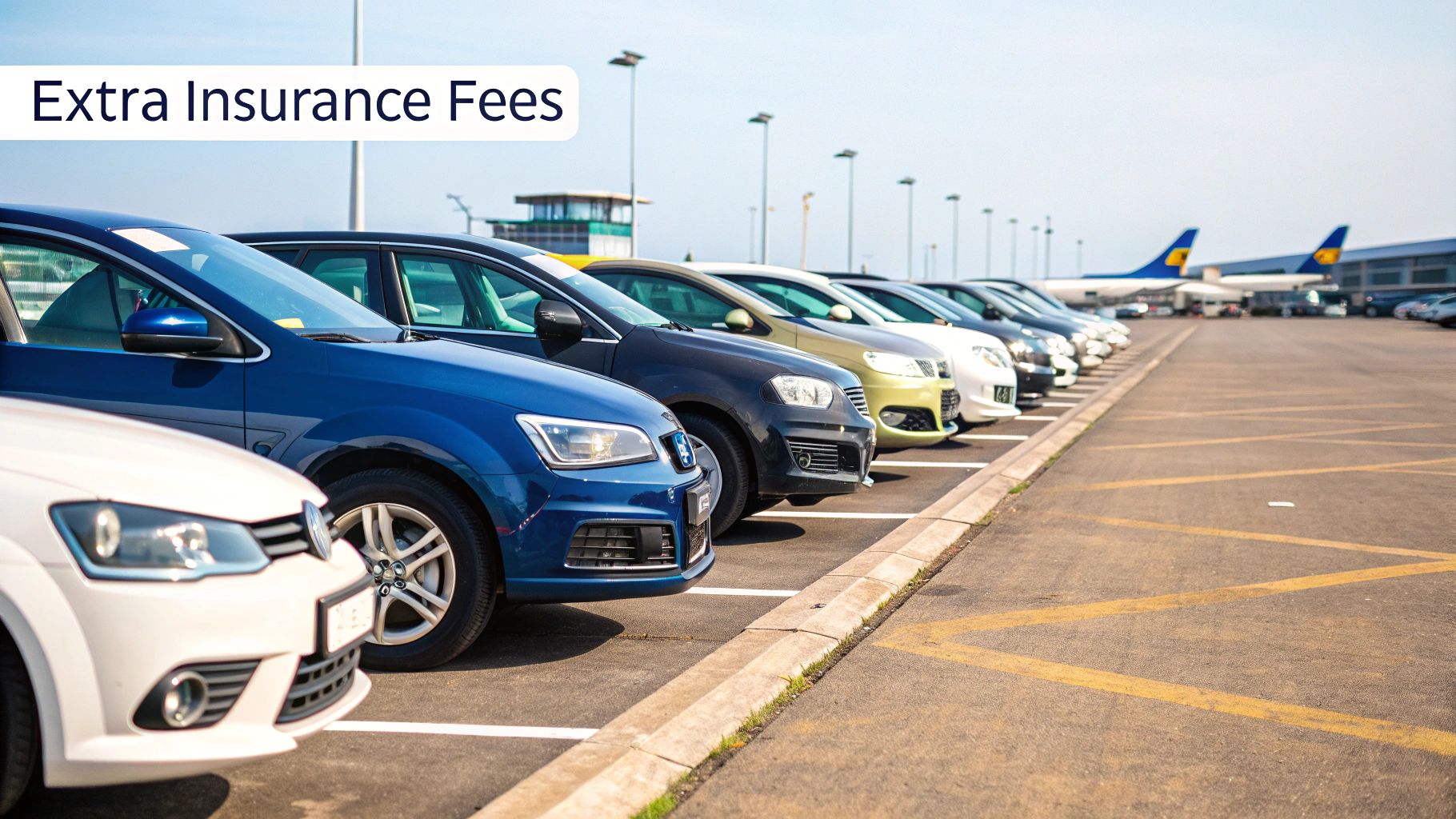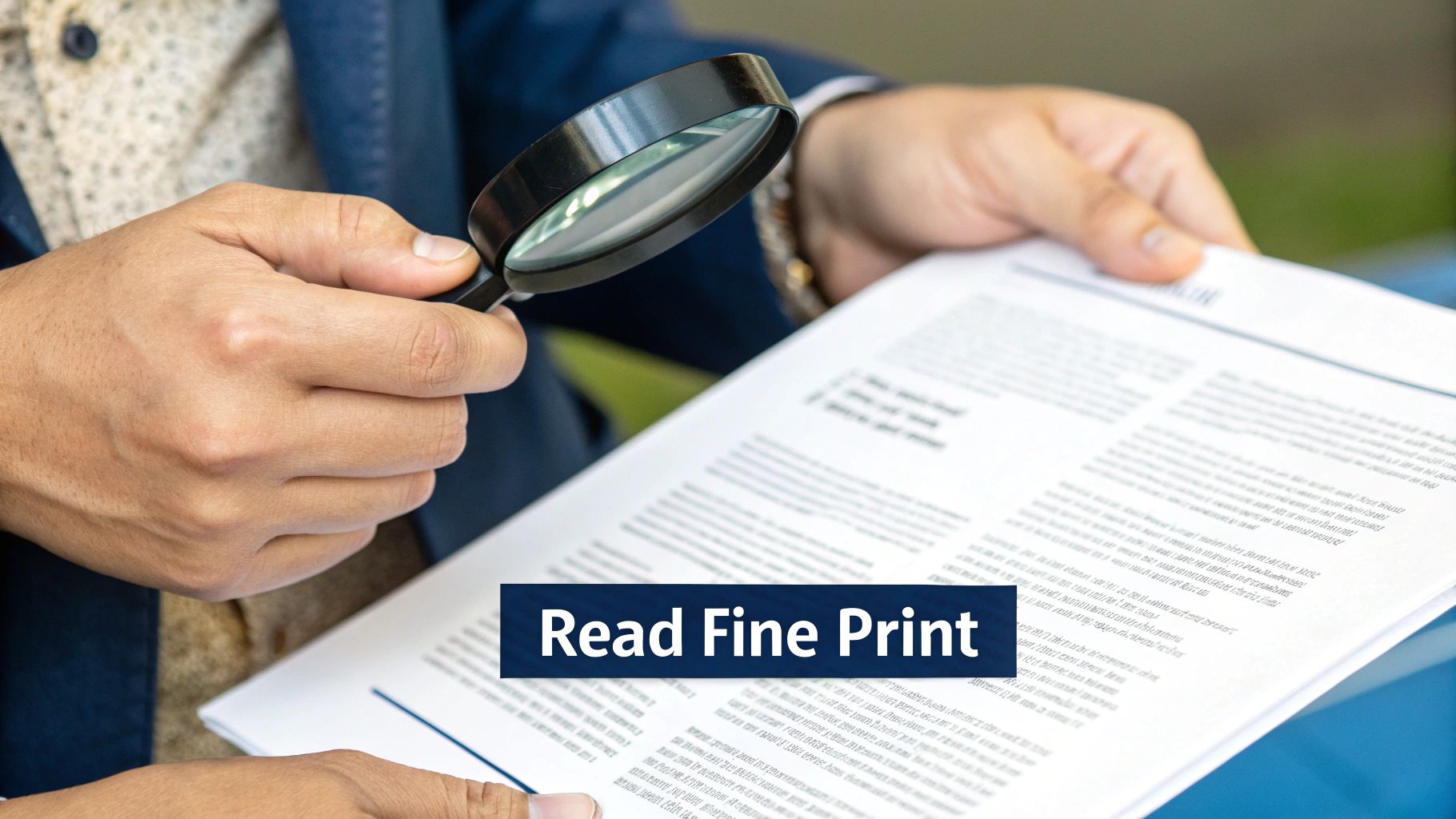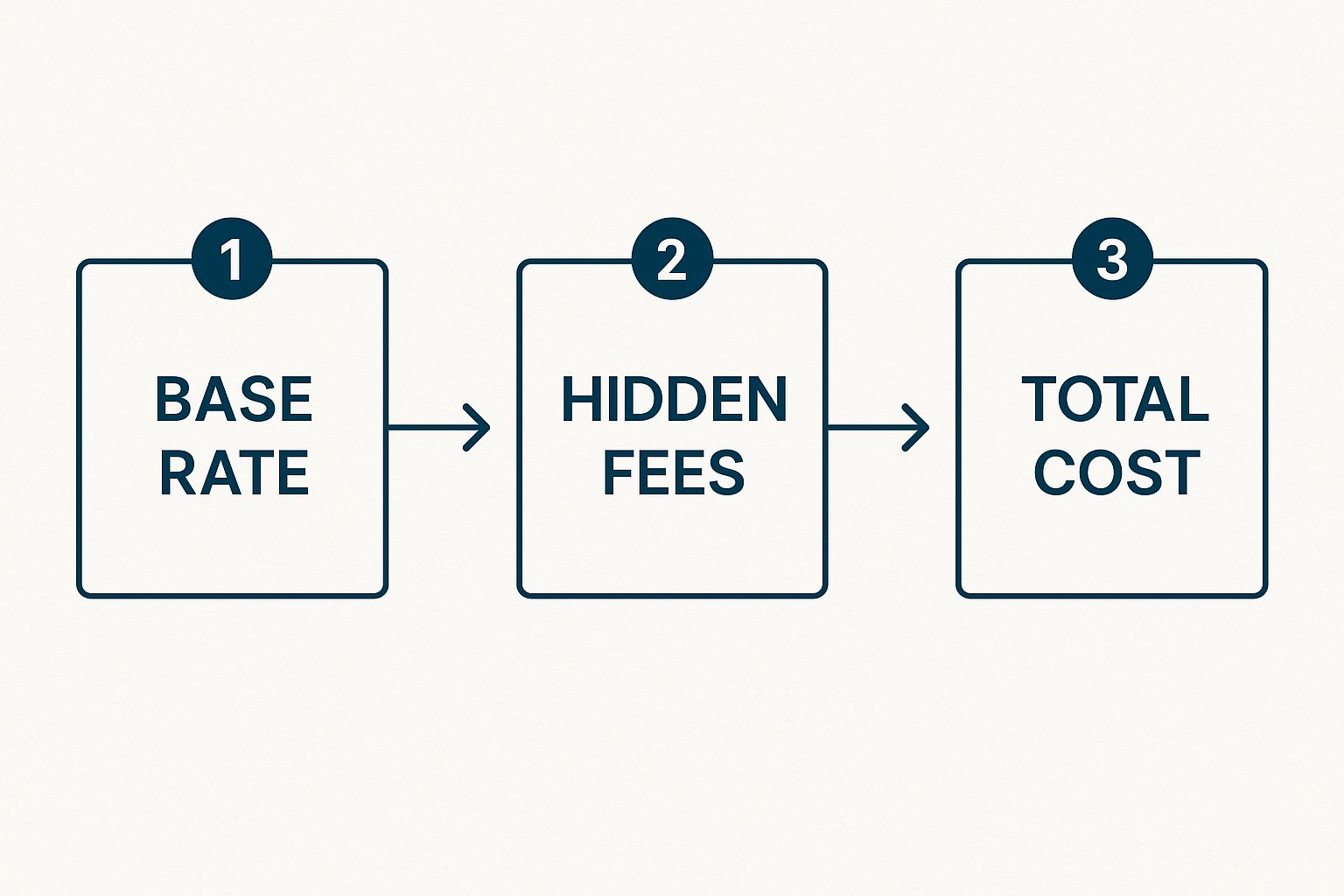A Guide to Avoiding Rental Car Hidden Fees
- fantasma70
- Sep 1, 2025
- 13 min read
You know that amazing deal you snagged on a rental car online? Let’s be real—it's almost never the price you actually end up paying.
The world of rental cars is notorious for hidden fees that can quickly inflate your bill, turning what looked like a bargain into a major headache when you get to the counter. These sneaky charges cover everything from simply picking up your car at the airport to confusing fuel policies and last-minute insurance upsells.
Decoding Your Rental Car Bill
The second you walk up to that rental desk, the price you were quoted online starts to creep up. That low base rate was the bait, designed to get you in the door. From that point on, a whole host of taxes, surcharges, and fees get tacked on.
Many of these are either mandatory or presented in a way that makes you think they are. It’s a frustrating process that can easily bloat your final bill by 40% or more.
To beat the system, you first have to understand it. Rental companies don't make much on the basic car rental itself. Their profit comes from selling you high-margin add-ons and passing their own operating costs directly on to you.
Common Culprits Behind High Bills
The worst offenders are usually buried in the fine print or pushed on you by an agent working on commission. These aren't just small add-ons; they can drastically change what you owe.
A few of the usual suspects include:
Airport Surcharges: Grabbing your car at the airport is super convenient, but you pay a premium for it. Watch out for things like "Concession Recovery Fees" or "Customer Facility Charges"—those are just the airport’s costs being passed on to you.
Insurance Upsells: Get ready for the hard sell. Agents often use high-pressure tactics to get you to buy a Collision Damage Waiver (CDW) or other policies. You might not even need them if your personal car insurance or credit card already has you covered.
Confusing Fuel Policies: The "Prepaid Fuel" option sounds simple, but it’s almost always a bad deal. You'll pay more per gallon than if you just filled up the tank yourself before returning the car.
This isn't just random chance; it's a deliberate pricing strategy that varies from company to company. For instance, a week-long rental from Enterprise might run you about $480, while the exact same car and dates from National could be closer to $695. That $215 difference is all about how each brand builds those unavoidable fees into its pricing. You can dig deeper into these rental car cost breakdowns to see how it all adds up.
My two cents: Think of that advertised daily rate as a marketing gimmick. Your real cost is the base rate plus a stack of mandatory fees, taxes, and any extras you agree to—knowingly or not.
To help you get ahead of the game, I've put together a quick cheat sheet of the most common surprise fees.
Top 5 Rental Car Hidden Fees at a Glance
This table breaks down the fees you’re most likely to see on your bill. Knowing what to look for is half the battle.
Fee Category | Common Name on Bill | Estimated Cost |
|---|---|---|
Airport Pick-Up | Concession Recovery Fee | 10-15% of base rate |
Facility Maintenance | Customer Facility Charge (CFC) | $5-$10 per day |
Insurance Add-On | Collision Damage Waiver (CDW) | $15-$30 per day |
Fueling Service | Prepaid Fuel Option | Inflated price per gallon |
Administrative Tolls | E-Toll / Transponder Fee | $5-$15 per day + toll cost |
Keep this list in mind when you're booking and especially when you're at the counter. A little awareness can save you a lot of money.
The Real Cost of Airport Car Rentals

Grabbing your car right after you land is the dream, right? No fuss, no extra travel. But that convenience comes with a hefty price tag. Airport rentals are notorious for piling on rental car hidden fees, and they can blow up your budget before you even leave the parking lot.
These aren't just small taxes, either. We're talking about significant surcharges that rental companies are forced to collect for the airport. In short, you're the one paying the premium for their prime real estate at the terminal.
Decoding Airport Surcharges
When you look at your rental agreement, you'll see a bunch of official-sounding line items that are easy to skim over. These fees get passed from the airport to the rental agency and then, you guessed it, straight to you. Let's pull back the curtain on the most common ones.
The two biggest offenders you'll almost always see are:
Airport Concession Recovery Fee (ACRF): This is just a fancy way of saying you're covering the rent the car company pays to operate at the airport. It's usually a percentage of your total rental, often somewhere between 10% and 15%.
Customer Facility Charge (CFC): This flat daily fee pays for things like the rental car center or the shuttle bus that gets you there. Expect this to add another $5 to $10 per day to your bill.
These charges add up fast. In fact, renting directly from the airport can cost you up to 40% more than picking up a car just a few miles away. For instance, at a major hub like LAX, a weekly rental can leap from $393 at an off-site location to $593 at the airport. That’s a $200 difference for the exact same car.
Pro Tip: When booking online, always click to expand the "Taxes and Fees" section before you commit. This is exactly where those airport-specific charges are tucked away. Never trust the initial daily rate you see advertised.
Smart Strategies to Avoid Airport Fees
The good news? With a little planning, you can dodge these fees entirely. The whole game is simply to rent your car from a location that isn't on airport property.
Here are a few ways to do it:
Go for a City or Neighborhood Branch: Search for rental offices a few miles from the airport. A quick taxi or rideshare trip to pick up the car is almost always cheaper than the fees you’d pay for on-site convenience.
Use Your Hotel Shuttle: If your hotel has a free airport shuttle, take it! You can either have the rental agency drop off a car at your hotel or pick one up from a nearby branch the next day.
Find a Rental Office with a Shuttle: Many off-airport rental locations run their own shuttles to and from the airport terminals. This gives you the best of both worlds—you get the ride and you skip the crazy fees.
Exploring these options can land you some fantastic car rental deals and put money back in your pocket. A tiny bit of extra effort here can easily save you $100 or more on a week-long rental, which is much better spent on your actual trip.
Navigating Insurance and Fuel Policies

This is where a good deal can quickly go bad. Standing at the rental counter, you’re often in a high-pressure spot where agents are trained to push expensive add-ons that can blow up your budget.
Two of the biggest money-makers for rental companies are their insurance packages and fuel policies. If you can get these two things right, you’ll sidestep some of the most common and costly rental car hidden fees.
Choosing the Right Fuel Option
It might seem like a small detail, but the fuel policy you choose can tack on a surprising amount to your final bill. You’ll usually see a few options, and they are definitely not created equal.
Full-to-Full: This is almost always your best bet. You get the car with a full tank and you just have to return it the same way. It means a quick stop at a gas station before you drop the car off, but you only pay for the gas you actually used at normal, local prices. Simple.
Prepaid Fuel: They'll sell this as a convenience. You pay for a full tank of gas upfront, so you don't have to refuel it yourself. The catch? The price per gallon is usually much higher than at the pump, and there's no refund for any unused fuel. If you bring it back half-full, you've just given them free gas.
We Refill: Avoid this one at all costs. If you don't prepay and you don't return the car full, the rental company will fill it for you. They’ll charge an outrageously inflated price per gallon—sometimes double or triple the local average—and then add a hefty service fee on top.
At the end of the day, the 'full-to-full' policy is the way to go. It’s the most straightforward and cheapest option, hands down. For more practical travel advice, you can always check out the other articles on our blog: https://www.cars4go.com/blogs.php.
The Insurance Upsell Dilemma
Next up is the insurance conversation. This is where costs can really get out of hand. The rental agent will likely run through a list of coverage options, like a Collision Damage Waiver (CDW) or Supplemental Liability Insurance (SLI), often using language that makes it sound essential.
My best advice? Know what coverage you already have before you get to the counter. Many people are already covered by their personal car insurance or the perks on their travel credit card.
A quick call to your insurance provider and credit card company before your trip can save you a ton of money and stress. Just ask them directly what’s covered when you rent a car. That five-minute conversation gives you the confidence to say "no, thank you" to expensive, redundant policies.
These extra insurance plans can easily inflate your rental cost by 30-50% or more. That great rate you found online? Suddenly it’s not so great.
When you're sorting through rental insurance, it's good to know that specialized coverage exists for almost anything, like car key replacement insurance in case you’re worried about losing the keys. Being informed is your best defense against making a costly decision under pressure.
How to Sidestep Those Pricey "Optional" Add-Ons

Just when you think you’ve sorted out the insurance and fuel policies, the rental agent will hit you with the "optional" add-ons. They sound helpful, sure, but make no mistake—these are high-profit upsells designed to slowly but surely inflate your final bill.
Each one comes with a daily charge that might seem trivial. But over a week-long trip? It adds up fast. The real trick is knowing what you genuinely need versus what’s just a pricey convenience.
Tech, Tolls, and Other Gadgets
It’s no surprise that some of the most common upsells are tech-related. Rental companies have figured out how to turn tools you probably already own into daily profit centers.
You'll almost certainly be offered these:
GPS/Navigation: This is one of the easiest fees to avoid. They'll ask for $10 to $15 a day for a clunky dash-mounted unit. Your smartphone, with apps like Google Maps or Waze, is far superior. Just toss a car mount and a charging cable in your bag and you’re set.
Toll Transponders: These gadgets are sold as a time-saver, but they come with a daily "convenience" fee of $5 to $15, on top of the tolls themselves. If you’re just passing through a few tollbooths, it’s almost always cheaper to pay with cash or a card. Check ahead of time if your personal transponder (like an E-ZPass) works in the area you’re visiting.
Here's a pro tip: Before you even leave for your trip, use your phone's map app to download the entire map of your destination area for offline use. You’ll get flawless navigation without burning through mobile data or needing their GPS.
Who's Driving and Where Are You Going?
Beyond the gadgets, companies have a whole menu of fees related to the logistics of your trip. These can really sting if you’re not ready for them.
Additional Drivers: Planning to share the driving? Most agencies will charge you for the privilege, typically $10 to $15 per day for every person you add. It's always worth asking about their policy, as some companies will waive this fee for a spouse or domestic partner.
One-Way Drop-Offs: Picking up in one city and dropping off in another is convenient, but it can trigger a massive surcharge. This fee can be a manageable $50 or balloon into hundreds of dollars, depending on the distance and locations.
Mileage Limits: Unlimited mileage feels standard these days, but don't assume you have it, especially on a special promotional rate. If you go over the daily or total cap, you could be looking at a painful $0.25 to $0.50 for every extra mile.
Child Safety Seats: Traveling with kids means you need a car seat, but renting one from the agency will set you back $10 to $15 per day. For a trip longer than a couple of days, it's often way cheaper to just bring your own. Most airlines will even let you check a car seat for free.
Your Game Plan for a Fee-Free Rental
Renting a car shouldn't feel like navigating a minefield of surprise charges. To beat the rental companies at their own game, you need a solid strategy. Think of it this way: the more you know before you walk up to that counter, the more money you'll keep in your pocket.
Let's walk through the process, step-by-step, to help you spot, question, and flat-out refuse those sneaky fees.
This is a perfect example of how a low advertised price can balloon with fees you never saw coming.

As you can see, the initial rate is just the starting point. It's all the extras that really drive up the cost.
Before You Even Book
Your best defense against hidden fees happens right at your computer, long before you see the car. This is where you have the most control and can lock in a genuinely good deal.
Read the Fine Print (No, Really): I know, nobody likes doing it. But before you hit "confirm," find and expand the "Taxes and Fees" section. This is where they hide things like a "Concession Recovery Fee" or a "Customer Facility Charge," especially if you're renting from an airport.
Check Your Own Coverage First: Make two quick calls. First, to your auto insurance agent, and second, to your credit card company. Ask them a simple question: "What's my rental car coverage?" Knowing you're already covered for damage gives you the power to confidently say "no thanks" to the pricey Collision Damage Waiver (CDW) they'll push on you at the counter.
Compare the *Total* Price: When you're shopping around, ignore the big, splashy daily rate. Always compare the final, all-in price, including all those mandatory taxes and fees. A company that looks $5 cheaper per day can easily end up costing you $50 more in the end.
The only number you should care about is the total estimated cost. The advertised daily rate is pure marketing—don't fall for it.
At the Rental Counter
Okay, this is showtime. You need to be friendly but firm. The person behind the counter is often incentivized to upsell you on things you don't need. A few direct questions will make it clear you know what you're doing.
Get It in Writing: Before you hand over your credit card, ask for a printed itemized receipt. Go through it line by line. If you see a charge you don't recognize or didn't agree to online, ask them to explain it.
Clarify the Fuel Policy: Say this out loud: "I'd like to confirm I'm on the ‘Full-to-Full’ fuel plan." This locks you in to returning the car with a full tank yourself, avoiding their ridiculously high refueling service charges.
Just Say No to Add-Ons: They'll offer GPS, toll passes, and satellite radio. Unless you're absolutely positive you need one of these and are fine with the daily fee, your answer should be a polite but firm "no, thank you." Your smartphone can handle all of that for free.
During and After Your Trip
You're not in the clear just yet. The last part of your rental is crucial for avoiding bogus damage claims and post-rental charges.
Become a Photographer: Before you even put the key in the ignition, do a slow walk-around of the car. Use your phone to take pictures and a quick video of every single scratch, ding, or scuff you can find. Do the exact same thing when you drop it off. This is your undeniable proof of the car's condition.
Keep Your Paper Trail: Don't throw anything away. Hang onto your final, signed rental agreement and the receipt from when you filled up the gas tank right before returning the car. These are your best defense if a surprise charge shows up on your credit card statement weeks later.
Follow these steps, and you can rent with confidence, knowing you won't be taken for a ride. And if you're trying to find the perfect vehicle for your journey, you can always explore the different car types available for rent to find one that fits your needs and budget.
Common Questions About Rental Car Fees, Answered
Feeling a little lost in the sea of rental car terms and potential costs? You're not alone. Getting a handle on a few key industry practices can make a world of difference, empowering you to spot and challenge those sneaky charges before they hit your wallet.
Let's clear up some of the most common questions travelers run into.
What if They Charge Me a Fee I Never Agreed To?
You absolutely have the right to push back on any charge that wasn't disclosed when you signed the rental agreement.
Your first and best opportunity to fight it is right at the rental counter. If an agent adds a fee you don't recognize, politely but firmly ask them to show you exactly where it is in the contract you signed. If they can't, insist that they remove it.
Spotted the surprise charge on your credit card statement after you've returned home? Don't sweat it. Gather your documents—the rental agreement, your receipt, any photos you took—and contact the rental company's customer service department. If they're unhelpful, your next step is a credit card chargeback. Just call your card issuer, explain the situation, and they'll investigate on your behalf.
Is Booking a Rental Car Way in Advance Always Cheaper?
Not necessarily. It's a common myth that booking months ahead guarantees the best price. Rental car rates fluctuate wildly based on supply and demand, and sometimes you can snag a fantastic last-minute deal.
Here's the pro-level strategy: Book a car with a free cancellation policy as soon as you know your travel dates. This locks in a vehicle for you. Then, a week or two before your trip, check the rates again. If the price has dropped, you can cancel your original reservation and rebook at the lower price. It's the best of both worlds.
This simple trick gives you peace of mind without locking you into an inflated rate.
Is My Credit Card's Rental Insurance Good Enough?
Probably not, and this is a big one. Most credit cards offer secondary collision coverage, which is a crucial detail. This means it only kicks in after your personal auto insurance has paid its share, acting more like a backup for your deductible.
What’s more, this coverage almost always has gaps. It typically covers damage or theft of the rental car itself but often leaves you exposed by excluding:
Liability for damage to other vehicles or injuries to other people.
Medical expenses for you or your passengers.
Exotic or luxury cars, large passenger vans, and trucks.
Before you rely on it, call the number on the back of your card and ask for the specifics. You need to know exactly what’s covered, what isn’t, and how to activate it—which almost always requires declining the rental company’s expensive Collision Damage Waiver (CDW) at the counter.
At Cars4Go Rent A Car, we think renting a car should be straightforward. That's why we focus on clear, all-inclusive pricing. The price you see is the price you pay, so you can plan your trip without worrying about surprise fees. When you're ready for a hassle-free trip, book your Miami rental with us.



Comments